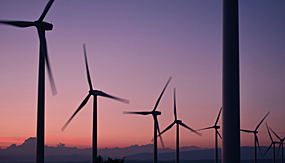
© Unsplash
In the Circwaste project, Prizztech Oy, a development company based in Pori, is exploring new applications for industrial side streams. At the heart of Prizztech's sub-project is the Peittoo Circular Economy Park, which serves as a hub for different material flows. The site can be used as an intermediate storage site for materials or as a production area for secondary raw materials.
There are also six wind power stations in the Peittoo Circular Economy Park area. “There is already some activity in the park area, but once the zoning process has been completed, we will get off to a good start,” says Project Manager Sami Leppimäki from Prizztech Oy.
Recycled magnets replace virgin natural resources
The business potential of recycled magnets has been studied at Prizztech. The sub-project tested the dismantling of a previously decommissioned large permanent magnet rotor and the recycling of magnets through grinding as raw materials for new magnets. The results of these experiments have been used in the study of the business potential of magnets.
Prizztech has actively collaborated with e.g. Stena Recycling. The company has developed the concept of recycling the wings and blades of wind power stations. “The number of wind power stations, especially around the Baltic Sea, is very high, and Stena Recycling's location near the port of Tahkoluoto offers good operating conditions for dismantling plants,” says Minna Haavisto from Prizztech Oy. If necessary, the area of the Peittoo Circular Economy Park can also serve as a storage area for Stena Recycling.
“Demand for rare earth metals is growing and the amount of use will increase significantly in the future, for example, as the number of wind power and electric vehicles grows. Currently, we are totally dependent on the Chinese market as there is no production of rare earth metals in Europe. Mining of metals always causes environmental damage. In the case of rare earth metals, recycling should be the number one priority when production cannot be increased indefinitely. And the question is also important from the point of view of self-sufficiency,” says Haavisto.
Industrial interest in recycled magnets
According to Haavisto, four alternative recycling routes can be used for the reuse of discarded magnets. The most energy-efficient and ecological option would be to reuse magnets as such, but this is often not possible. When utilising magnets as material, the most energy-efficient option is the pulverisation method, in which the properties and shape of the magnet can be modified as desired. This method achieves, at best, a property level approximately 98% equivalent to that of magnets made of virgin material.
However, not all customers are willing to compromise on these features. At the moment, for example, recycled magnets cannot be used in wind generators due to their strict characteristic requirements, but they can be used in other engines. For example, manufacturers of elevator motors have been interested in using recycled magnets.
“For magnets made from recycled raw materials, there must be a customer who is willing to compromise the requirements for magnetic properties, but gain a brand advantage from the use of recycled materials,” says Haavisto. The price must not be higher than the price of virgin material. However, the cost of separation for the recycler should be covered by the price.
Business potential for recycling companies
According to Haavisto, recycling of wind generator magnets can become a business for recycling companies if it is integrated into the process of dismantling and recycling of wind power plants. Particularly in the case of large magnets, it is possible to make recycling a profitable business.
In the case of the smaller magnets used in electronics, there is still work to be done on how to separate the rare earth metals and mould them to match the virgin material. Prizztech has also exained the automated removal of magnets from medium-sized motors, but the experiments have not yet yielded results. “However, a lot of research and development work is being done on the separation of rare earth metals, for example, in Jyväskylä and Lappeenranta. We hope to develop a recycling process for rare earth metals in Europe.”
Read more
More information
- Project Manager Minna Haavisto, firstname.lastname@prizz.fi
- Project Manager Sami Leppimäki, firstname.lastname@prizz.fi